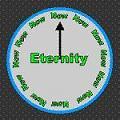

Peter Lynds on The Physics of Time
Another, this one antique: How do you reach a goal? You cover half the distance, then half of that, then half of it. You keep halving your distance but always another half remains.
In fact, we do reach goals, but the above paradox has stumped philosophers for centuries. (Newton was able to predict the goal, but his calculations were inferred from a universe quantum physics undermines.) A 28 year old New Zealander and college drop out thinks he has an answer, and he has many physicists impressed with the boldness of his theory.
A tutor at a broadcasting school, Peter Lynds believes that his idea is quite simple and should have been recognized by other thinkers much earlier. Of course, he has uncommon sense. The problem has been with common sense, which gets in the way of understanding and has done so for centuries.
Peter Lynds believes that the mistake lies with thinking of time as a series of moments. From antiquity to the present, philosophers and physicists have assumed that objects in motion have determined positions at any instant in time. It's not true, Lynds says. In an interview with Astroseti.org, he says "People have wrongly assumed that an object in motion has a determined position at any instant in time, thus rendering the body's motion static at that instant and enabling the impossible situation of the paradoxes to be derived." One can infer from this that we believe in time because our brains are hard-wired for us to do so. Neurobiology.
Of course, the implication of his idea is that time has no flow as it would require progression through definite instants. If no progression, and no flow, then there is "freeze." We don't move, you and I. We are frozen in time.
This, too, seems paradoxical but reason offers at least one way out. There is no you or I, at least not in the usual, the common, sense. This requires exploration of one's own mind, as philosopher David Hume did, wherein he found no sufficient empirical evidence for the existence of a self. Of course, he was preceded in this by millennia of consciousness explorers from the Buddha and before.
In brief, can Lynds' theory make sense? Yes, but uncommon sense is required. After all, among the adults, a little boy pointed out that the emperor was naked.
The paradox is enhanced by the evidence of physics. Time does not seem to be inherent in nature, which, so to speak, has no need for it. Einstein's Special and General Theories have demonstrated that
All of this is counter-intuitive. It defies common sense.
In its early days, physics wanted to separate the psychological from the evidentuary or traditionally theoretical. It finally accepts that these aspects are hopelessly intertwined. This takes me back to common vis a vis uncommon sense. All calculations, all theories, all experiments ensue from ways of seeing. If the emperor seems clothed, then he will be described thus. What do I mean? Henri Bergson said that time is merely a personal construct (read: psychological) that we force as fact.
I might as well end, then, on the psychological. Marcel Proust exquisitely explored his own psychology, to include how tea tasted in his childhood. I will close with part of a lovely passage, one that opens Swann's Way, of In Search of Lost Time (or Remembrance of Things Past, as I learned it):
"And as I would lay in bed, I would listen to the whistle of trains. At which point I would try to reckon the passage of time."

No comments:
Post a Comment
Note: Only a member of this blog may post a comment.